

Despite how you might personally feel about downloading vs. streaming music, it’s abundantly clear that streaming is the way of the future. Just look at how many popular services there are: Spotify, Pandora, SoundCloud, and even YouTube is now officially embracing the goodness of music streaming.
But a lot of these services are Web-centric, and as far as their Android counterparts are concerned, it’s very hit-or-miss. A couple of them are spectacular, but most are flawed in some way or another.
So if you mainly stream music on Android, here are the apps you need to consider.
Spotify is the reigning king of streaming music. Its library is absolutely massive, spanning everything from mainstream goodies (except for Adele and Taylor Swift, unfortunately) to some of the most obscure artists you’ve never heard of.
In terms of popularizing the notion of streaming, Spotify is very much the Netflix of music, and there’s a reason for its excellent reputation: the service is high quality, and there aren’t any competitors that can play at Spotify’s level yet.
Overall, there’s a lot to love about Spotify’s Android interface. Whether you’re on a tight-screened smartphone or a big-screened tablet, everything is cleanly laid out and intuitive to follow — no hidden long-press menus for basic functions, which is a relief — and absolutely no clutter.
What’s particularly nice is that you can play Spotify on multiple devices, and they’ll stay synced up: if you move onto the next song with your smartphone, so will your tablet.
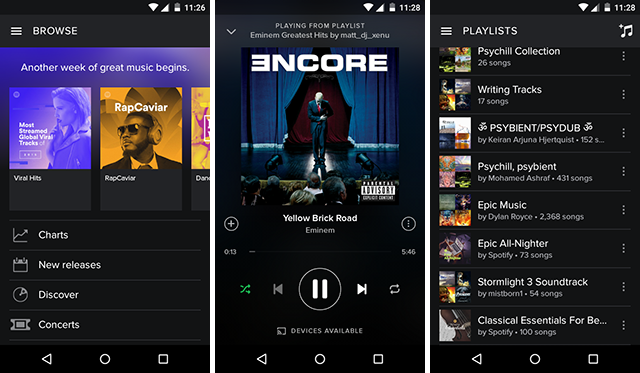
My only real complaint is that everything is on the cloud (unless you have a paid account, which we’ll discuss in a bit), so pages and songs can be slow to load at times. Switching between playlists takes a few more seconds than you might expect, and over time, this can be annoying.
Be sure to heed these amazing Spotify tricks and tips to get the most out of it, especially if you bounce between the Android and desktop/Web versions.
The Free version of Spotify is quite unrestricted, but it does play audio ads every few songs. Premium accounts have no ads at all, allow for unlimited skips, and give you the ability to download songs for offline playback.
Don’t forget to take advantage of the offer for 3 months of Premium for $1 while you still can!
In late 2015, Google launched a new mobile app called YouTube Music, designed for users who love using YouTube as their main source of music. In fact, music is the most common content type of all YouTube traffic. Not too surprising, is it?
What is surprising is just how useful this app actually is. I immediately wrote it off as a gimmick when I first heard of it, but having given it a try, I have to say I’m impressed.
One downside is that it requires you to log into a YouTube account before you can start using the app. An anonymous (or guest) option would be really nice, but considering how Google likes to force app logins, I don’t expect that to change.
Note that the first time you use YouTube Music, you’ll be signed up for a free 14-day trial of YouTube Red. No payment information is required, so don’t worry. Just something to be aware of.
The best feature of YouTube Music is that it lets you listen in audio-only form (not available for free accounts). For users on slower connections or those who are tight on data, this feature is a game-changer over the regular YouTube app.
The interface is pretty straightforward — nothing fancy about it, but it never gets in the way either. One thing that I’m glad exists is the Liked Songs list, which is based on all the liked videos on your account.
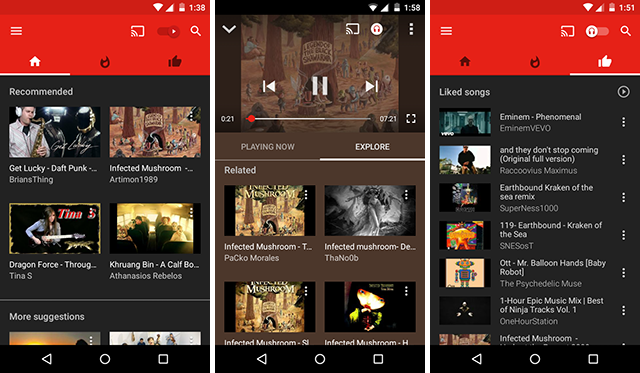
But the selling point of this app is that it dynamically generates stations of similar songs whenever you play something. As you listen and like, it learns your tastes and the recommendations become more accurate.
And of course, the app allows you to cast the songs you’re listening to onto any Chromecast-connected device.
The app is completely free, but ad-supported. With a YouTube Red subscription — $10 per month — you can get rid of ads, download music for offline playback, and listen in audio-only mode. Though there have been some criticisms of YouTube Red since its launch.
Google Play Music comes pre-installed on most Android smartphones these days, but if you don’t have it, you can always get it for free right on the Play Store. And you should! Play Music is oft-considered to be one of the best Android music players.
It’s a two-in-one kind of deal: there is streaming music radio that you can listen to, or you can upload your own music and stream it on the Web or Android no matter where you go. It’s really convenient and the closest competitor to Spotify.
The interface is modern and easy to navigate — the same kind of experience you’d expect from any of Google’s other apps. It’s very fast and responsive, even on a last-gen device like mine, so you’ll rarely be frustrated by lag.
While it’s easiest to just browse stations and libraries based on titles, artists, or genres, Play Music can curate music for you based on decades, activity, or even your current mood. Want happy, uplifting songs? Google can deliver.
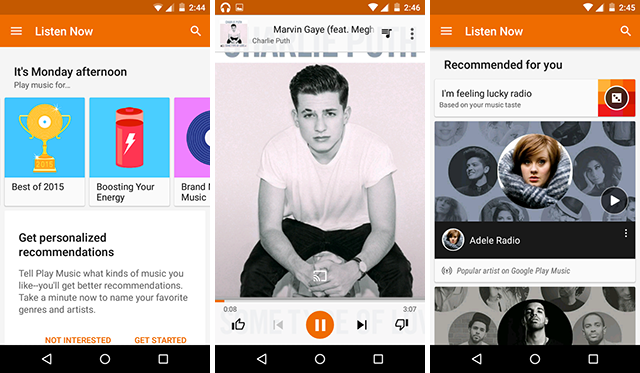
The whole process of uploading is easy, too. Just transfer your music files onto the device — typically using a USB cable or a wireless connection — and use the app to pick and choose the ones you want uploaded to your account. (Or just use your PC’s browser instead.)
Free accounts are limited to 50,000 uploaded songs, which is way more than you think it is, and they have audio ads for radio. A subscription costs $10 per month, but it includes downloading for offline playback, no ads at all, and YouTube Red access.
SoundCloud is a bit different from the rest of the apps here, but this difference is what makes it a worthy mention. It’s not great for listening to your own music library, nor is it good for mainstream radio — it’s for the in-between: budding musicians and indie artists.
If you aren’t using SoundCloud already, you really should. There’s an entire world of undiscovered music out there that you won’t find on Spotify, Pandora, or YouTube.
The reason why SoundCloud is so great for indie artists is because it makes it incredibly easy to share your own music with others. The built-in Record feature records the audio playback of the device, and songs can be one-button shared to Facebook, Twitter, and Tumblr.
No other music service is as artist-centric as this one.
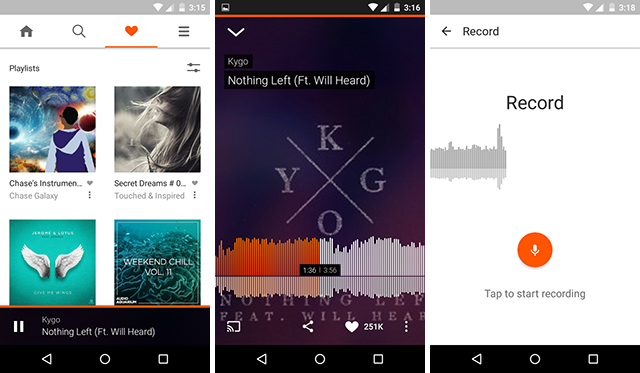
The interface is only okay, though. You’ll be able to get around just fine, but it feels a bit cramped and cluttered on devices with smaller screens (which is weird because it’s mostly just a case of excess whitespace). But overall, it’s smooth and fast, so I can’t complain too much.
Everything about SoundCloud is free. No paid accounts or subscriptions to worry about.
Pandora pioneered the modern Internet radio trend and consistently lands among the best of the best when it comes to Internet radio apps for Android. You probably know all about it by now, but in case you don’t, just know that we think very highly of it.
The thing to understand about Pandora is that it isn’t a source for on-demand music. If there’s a specific song you want, there’s no way to guarantee that Pandora will play it. However, as a way to expand your music exposure, Pandora is perfect.
Because this app is all about dynamically-generated stations, you can search for any song, artist, or genre, and Pandora will start spitting out songs that are similar to your search query. I can’t even count how many amazing songs I’ve found with my dozens of stations.
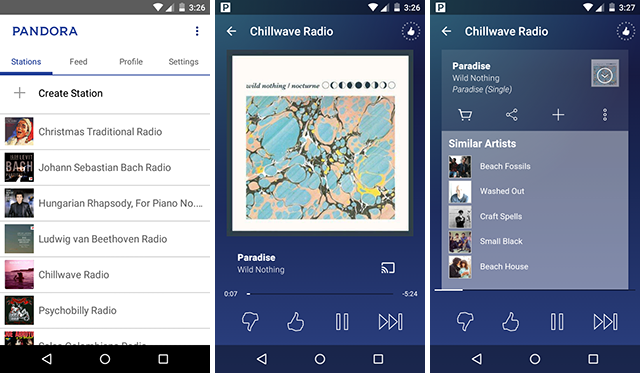
But because Pandora’s database of music is relatively small (only a few million), you may get sick of it. After 7+ years of regular Pandora use, there’s little left for me to explore in the genres that interest me.
Free users must deal with audio ads every few songs, a limit of 6 skips every hour, and standard audio quality. Pandora One costs $5 per month and removes the ads, greatly increases the skip limit, and improves the audio quality.
In the realm of Internet radio apps, TuneIn Radio is something special. Instead of just creating online music playlists — whether those playlists are dynamic or hand-crafted — TuneIn actually streams real-life radio. This instantly sets it apart from services like Pandora.
With over 100,000 radio stations available (including FM, AM, and digital) combined with the fact that it has talk shows, sports, and podcasts in addition to music, it’s pretty much impossible for you to explore everything it has to offer.
With so much to explore, it’s amazing that TuneIn never feels overwhelming. Everything is broken down into manageable categories, and the search bar is great at finding relevant stations.
But the thing that truly impresses me is Car Mode, which simplifies the interface into the bare essential functions represented by larger buttons. Since mobile music is often played during commutes and trips, it pleases me to know that they’re doing something to make it easier (and safer) for drivers.
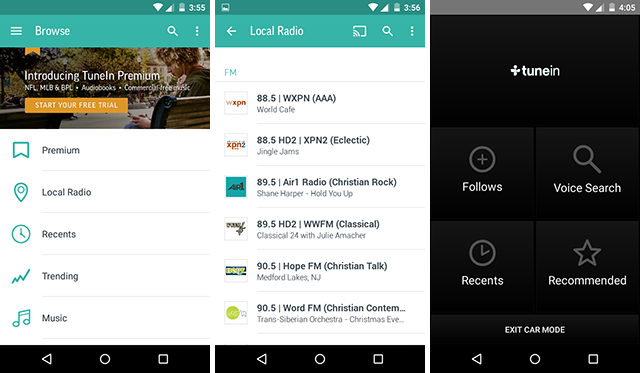
And lastly, unlike most other music streaming apps, TuneIn supports Chromecast, so you can cast whatever station you’re listening to onto any Chromecast-connected TV for better audio.
Free accounts can only access non-premium stations (but there are lots of them available) and must deal with banner ads in the app. Premium costs $8 per month and unlocks premium stations, removes banner ads, and even grants access to 40,000+ audiobooks.
If I could only choose one music streaming app to use, I would probably go with Spotify for its massive library of music and beautiful-yet-practical interface, but I’d also greatly miss all of the other apps.
Do pay special attention to YouTube Music. The concept is wonderful, and if it’s this good at launch, one can only imagine how much better it will be given another year or two of serious development.
And whatever you do, make sure you use this awesome smartphone trick when you’re playing music on your phone but need a bit more volume than your device can handle.
Which app do you prefer for music streaming? Is there one that we missed? Share your thoughts with us in the comments below!




 Batman: Arkham City Guide
Batman: Arkham City Guide Deus Ex: Mankind Divided Director Speaks Out About Mechanical Apartheid Complaints
Deus Ex: Mankind Divided Director Speaks Out About Mechanical Apartheid Complaints Get Trading Cards On Steam Without Actually Running The Game
Get Trading Cards On Steam Without Actually Running The Game F1 2015 (PC) beginners guide and tips to control
F1 2015 (PC) beginners guide and tips to control Ninja Gaiden Sigma 2 Plus Wiki .
Ninja Gaiden Sigma 2 Plus Wiki .